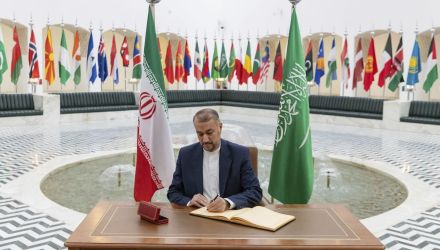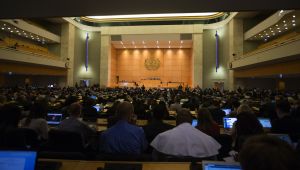As director for South Asia at the US National Security Council, Xenia Dormandy played a key role coordinating the July 2005 visit of Prime Minister Manmohan Singh to Washington. The trip resulted in the historic civilian nuclear agreement which today, under attack from the United Progressive Alliance’s Left partners, appears to be floundering.
Ms Dormandy currently serves as director of the Project on India and the Subcontinent at Harvard University’s Belfer Center for Science and International Affairs.
In an interview, Ms Dormandy expressed confidence that the nuclear deal would go through. It’s only a matter of when, she said.
Excerpts:
Sen: Can the US-India nuclear deal be saved at this stage?
Dormandy: The deal will go through; the only question is whether it is in early 2008 or after a new U.S. Administration in 2009. For it to move forward soon, it will require Prime Minister Singh to use his political equity to face-down opposition to the deal.
Q: The Bush Administration has invested a lot into this agreement and had hoped it could tout this deal as a foreign policy success. Will there be disappointment/frustration in Washington should this not go through before the end of the president’s term?
A: The US-India bilateral relationship is much broader than the nuclear deal. Regardless of whether the deal goes through during this Administration, this relationship still remains an enormous success. So, while there will likely be frustration at any delay in the deal, there are plenty of other areas in which we can work together and on which we should be focusing.
Q: The deal with China took over a decade to become operational. Did the Bush Administration set unrealistic timetables for the India deal? Were expectations raised too high?
A: It is hard to manage expectations when the two parties can see the incredible potential of engagement. There was no timetable to this deal but a recognition on both sides that they should take advantage of the opportunity to move events forward as fast as the system would allow. In fact, many believed, particularly on the Indian side, that this should have been done much earlier. Expectations are not too high – this will happen in time.
Q:What repercussions will a failure of this deal have on the US-India relationship? Would Washington be less enthusiastic about undertaking such ambitious initiatives with India?
A: The temporary hold on the deal need not have any negative implications for the broader relationship. In fact, it could have positive ones as the two sides are able to exert their attention and political will to address the plethora of other issues of mutual interest such as security, economics, trade, space, agriculture and more. As for lack of enthusiasm, this deal has done more to open the eyes of both bureaucracies to what is possible than anything else. While there will clearly be some who will continue to be reticent to engage, the message that should be taken out from this is the huge potential.
Q: If the deal gets kicked into the next administration how would it fare under a Democratic administration, or a new Republican administration?
A: No one should be under the illusion that this is not going to be a hard sell in the U.S. Congress. However, as the December 2006 vote on the Hyde legislation showed, this deal has enormous support on both sides of the aisle. The political orientation of the next administration is less relevant than the mere fact that this will be on hold while the new officials find their places and learn their portfolios.


